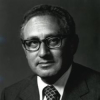Henry A. Kissinger

Henry A. Kissinger
Henry Alfred Kissingeris an American diplomat and political scientist. He served as National Security Advisor and later concurrently as United States Secretary of State in the administrations of presidents Richard Nixon and Gerald Ford. For his actions negotiating the ceasefire in Vietnam, Kissinger received the 1973 Nobel Peace Prize under controversial circumstances, with two members of the committee resigning in protest. Kissinger later sought, unsuccessfully, to return the prize. After his term, his advice has been sought by world leaders...
NationalityGerman
ProfessionStatesman
Date of Birth27 May 1923
CountryGermany
The key decision for a statesman is whether to commit his nation or not. There is no middle course. Once a great nation commits itself, it must prevail. It will acquire no kudos for translating its inner doubts into hesitation.
Every success is usually an admission ticket to a new set of decisions.
In the hands of a determined Secretary, the Foreign Service can be a splendid instrument, staffed by knowledgeable, discreet, and energetic individuals. They do require constant vigilance lest the convictions that led them into a penurious career tempt them to preempt decision-making.
I knew Deng Xiaoping when he came out of prison. He had, after all, been imprisoned for nearly ten years by Mao. I know what China looked like before he took over, and so in my own mind, I don't think of Deng Xiaoping as an oppressor. I think of somebody who, faced with that crisis, made a very painful and decision with which I cannot agree. But I also think of him as a great reformer.
The absence of alternatives clears the mind marvelously.
High office teaches decision making, not substance. It consumes intellectual capital; it does not create it. Most high officials leave office with the perceptions and insights with which they entered; they learn how to make decisions but not what decisions to make.
Realism in foreign policy is made up of a clear set of values, since difficult foreign policy decisions are often decided with the narrowest of majorities. Without any sense of what is right and wrong, one would drown in a flood of difficult and pragmatic decisions.
I want to get into the President's head some idea of what he can do. If military actions are recommended to him for decision, I want him to know what he is doing when he decides.
Congress can't do much more damage to us than they already have. To this extent we're liberated to do what is right. ... Our successors will be living in a nightmare if we don't do what is right.
an occasion to blow off their frustrations on an issue on which they didn't look as if they are begging (the United States) for help.
a review of withdrawal strategy ... seems in order.
My heart goes out to the president because I've served in an administration that faced a very divided country in a very difficult set of circumstances.
Because of the axiom that guerrillas win if they do not lose, stalemate is unacceptable, ... the military challenge in Iraq is more elusive.
Ninety percent of all politicians give the other ten percent a bad reputation.